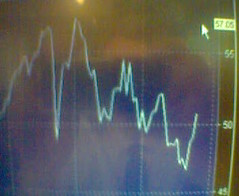On Monday, oil prices fell over 1% as fears about a poor Chinese demand and a lack of clarity regarding the stimulus plan weighed on sentiment.
Oil prices fell on Monday after a couple of weeks of gains as investors waited for Israel to respond to Iran’s attacks.
Today, the risk premium on oil prices has eroded a little as China’s inflation figures showed that consumer price index decreased further in September.
Brent crude oil, at $77.98 per barrel was down 1.3% at the time this article was written. West Texas Intermediate crude was $74.53 a barrel at the same time.
Deflation worries in China
Data from the National Bureau of Statistics showed that in September, the consumer price index increased by 0.4% compared to 0.6% in august.
In September, the producer price index fell by 2.8% compared to a decline of 1.8% in August. Analysts expected that the index would fall by 2.5% in September.
Reuters reported that the “Consumer Prices Index Reading from China” indicated a deflationary trend despite the authorities’ announcement of their most aggressive monetary stimuli in September.
Oil imports from China may also be affected by a poor demand. China is the largest crude oil importer in the world.
China’s stimulus package disappoints
China’s Finance Minister pledged on Saturday to increase debt significantly, but left investors guessing as to the size of the stimulus package.
China’s economy is still fragile and oil demand will be affected as well.
IG Market Analyst Tony Sycamore said to Reuters that briefing given by Chinese Finance Minister was a flop.
Sycamore said Reuters:
It is obvious that the fiscal measures required to eliminate downside risks and to ignite animal spirit in Chinese consumers are absent.
Forecast for this Week
This week’s oil prices will likely be influenced by China’s economic activity as well as the geopolitical risk.
Experts believe that hurricane Milton, which struck Florida last week, also shut down several oil installations in the Gulf of Mexico area. This could lead to a shortage of oil and higher prices.
The market is still waiting on Israel to take retaliation against Iran. The US, however, has warned Israel not to target Iran’s energy infrastructure.
The world’s crude oil supply could be reduced by 4% if Iran’s oil installations are attacked.
FXempire analysts said that West Texas Intermediate crude could reach $80 per barrel, if Israel attacks Iran next week.
James Hyerczyk is an author at FXempire. He said:
The downside risk remains if the demand in China or the U.S. does not improve, particularly with high crude stocks threatening to limit any gains.
Hyerczyk stated that traders should monitor geopolitical events and U.S. crude stocks reports to determine the direction of the market.
The monthly report on the oil market by the Organization of the Petroleum Exporting Countries, which will be released later today, is also likely to attract traders’ attention.
This post Oil drops over 1% amid deflationary fears in China may be updated as new information becomes available






